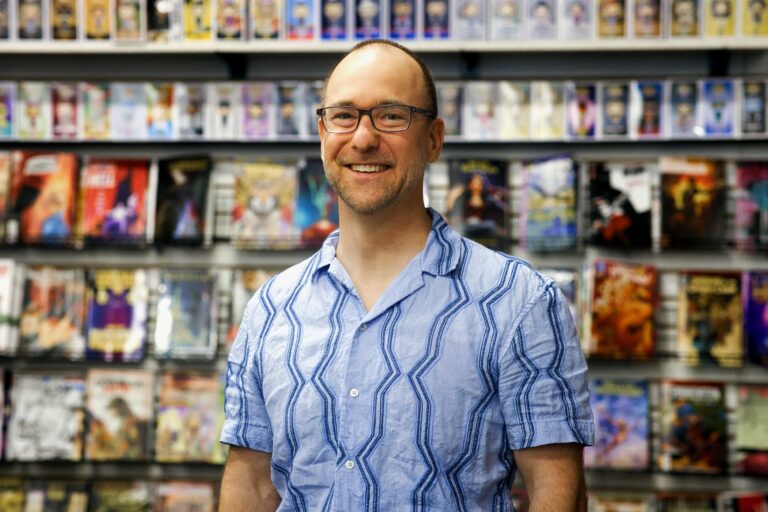A leading advisory board of recognized philosophers has identified Michigan State University’s Department of Philosophy as a premier place for graduate students from underrepresented populations to earn a doctorate degree.
In fall 2020, The Pluralist’s Guide to Philosophy commended the department’s approach, which fosters the use of traditional elements of philosophy while addressing practical issues of concern to society. Many of those issues, said Associate Professor and Department Chair Matthew McKeon, speak to the interest of underrepresented groups and promote the study of fields historically outside the realm of established philosophy programs.
Our mission at MSU is to expand philosophy’s traditional agenda to make the field more responsive to the multitude of human values in human communities.
Matthew McKeon, Chair of the Department of Philosophy
“Our mission at MSU is to expand philosophy’s traditional agenda to make the field more responsive to the multitude of human values in human communities,” McKeon said. “It’s a great honor that our peers at The Pluralist’s Guide see us as a place that gives philosophy a more inclusive and diverse key.”
The Power of Pluralism
The aspirations of the department, McKeon said, start with pluralism — or the concept that there are many equally authentic ways to study philosophy. That concept is reflected through a growing number of department faculty with appointments across many diverse disciplines including the sciences, global studies, and the arts and humanities. Many of our faculty are devoted to work in non-traditional subfields, including feminism, race and ethnicity, and LGBTQ issues. Some faculty are sought-out experts offering perspective for research, popular culture, or informative media.

“Recruiting and retaining a high-powered, visible faculty serves to attract more diverse students to our graduate programs,” McKeon said. “That, in turn, serves to diversify the profession and to make it more inclusive.”
The department also sets itself apart through an internship program that reaches beyond traditional placements. Established in 2017, the Engaged Philosophy Internship Program (EPIP) connects graduate student philosophers with community organizations and other non-academic partners. Internships have focused on animal rehabilitation, disadvantaged youth, gender equity, social justice, preservation of Indigenous languages, and a myriad of critical issues.
“The thought is to apply philosophical practices to engage with problems and people outside academia,” McKeon said. “At MSU, we believe that philosophy has the power to make a difference in the world.”
The thought is to apply philosophical practices to engage with problems and people outside academia. At MSU, we believe that philosophy has the power to make a difference in the world.
Matthew McKeon, Chair of the Department of Philosophy
Jessica Martínez Cruz choose MSU for her doctorate after discovering Michigan State University was among the few U.S. universities offering advanced studies in Black, Indigenous, and people of color philosophies. The feminist scholar-activist began her program in 2019. Before joining the doctoral program, she worked with the University in Nicaragua while participating in social research and non-formal educational processes in a diversity of social collectives.
Martínez Cruz leveraged the power of technology and completed an Engaged Philosophy Internship in summer 2020 despite the restrictions of COVID-19. Her goal was to examine principles related to the politics of memory, violence, and resistance, and to help design educational modules, a research lab for activists and journalists, and methodological training on social memory work.

She worked online with two organizations – one was the Interdisciplinary Institute of Social Sciences, the other a social collective of feminists, producers, communicators, and writers formed in the wake of state violence and protests. Her internship resulted in a course, a working lab, and a set of methodological tools for use by the two organizations.
“Engaged philosophy is compelling and attractive for people like me who are scholars and activists,” Martínez Cruz said. “We see academia as a means to actualize our ethical-political commitment with our people and communities.”
Engaged philosophy is compelling and attractive for people like me who are scholars and activists. We see academia as a means to actualize our ethical-political commitment with our people and communities.
Jessica Martínez Cruz, Ph.D. student in Philosophy
In addition to the Engaged Philosophy Internship Program, department faculty and students also work to empower the profession through the Center for Interdisciplinarity (C4I). This unique hub within the College of Arts & Letters brings together researchers from different backgrounds and uses philosophical methods to facilitate collaboration on complex, global problems like COVID-19 and climate change.
“The center recognizes that no individual discipline can provide a complete solution to what we call ‘wicked’ problems,” McKeon said. “Philosophy provides the tools that allow us to assess how disciplines relate to one another and to enhance cooperation among practitioners.”
Informing Issues
Being recommended by The Pluralist’s Guide, said McKeon, validates the department’s approach to the study and application of philosophy at the graduate level. With an increasing interest and steady influx of new students, the department continues to place graduates in prominent positions at academic institutions. Many, too, go on to be professional philosophers or influencers within their subfields at corporations or nonprofit organizations.
Undergraduates students also are beneficiaries of the department’s approach, with courses that inform ideas and principles beyond their majors or chosen vocations. The study of philosophy, McKeon said, can help students construct narratives for the contemporary world and to understand critical issues that challenge the human condition or interaction.
“Philosophy teaches you to ask questions that need to be asked and to solve complex problems in the world or workplace,” McKeon said. “Life is so much more than your vocation. The value of higher education in the arts and humanities fits right in with that.”


